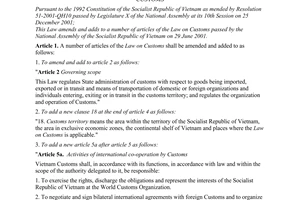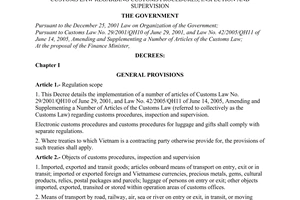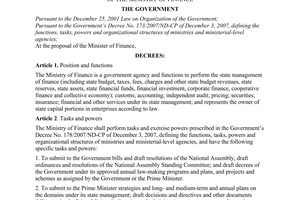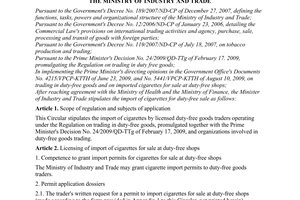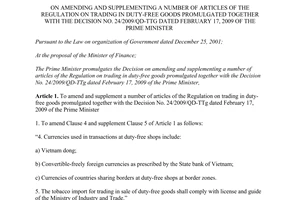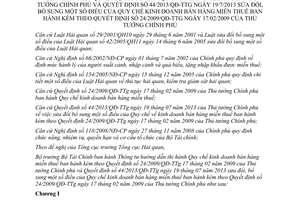Circular No. 148/2013/TT-BTC guidance on the regulation on selling duty-free goods đã được thay thế bởi Decree 167/2016/ND-CP on duty free business và được áp dụng kể từ ngày 15/02/2017.
Nội dung toàn văn Circular No. 148/2013/TT-BTC guidance on the regulation on selling duty-free goods
|
MINISTRY OF FINANCE |
SOCIALIST REPUBLIC OF VIETNAM |
|
No. 148/2013/TT-BTC |
Hanoi, October 25, 2013 |
CIRCULAR
PROVIDING GUIDANCE ON THE REGULATION ON SELLING DUTY-FREE GOODS PROMULGATED TOGETHER WITH THE PRIME MINISTER’S DECISION NO. 24/2009/QD-TTG DATED FEBRUARY 17, 2009 AND THE PRIME MINISTER’S DECISION NO. 44/2013/QD-TTG DATED JULY 19, 2013 ON AMENDMENTS TO THE REGULATION ON SELLING DUTY-FREE GOODS PROMULGATED TOGETHER WITH THE PRIME MINISTER’S DECISION NO. 24/2009/QD-TTG DATED FEBRUARY 17, 2009
Pursuant to the Law on Customs No. 29/2001/QH10 dated June 29, 2001 and the Law on the amendments to the Law on Customs No. 42/2005/QH11 dated June 14, 2005 on amendments to a number of articles of the Law on Customs;
Pursuant to the Government's Decree No. 66/2002/ND-CP dated July 1, 2002 on limits on luggage of outgoing and incoming passengers, duty-free gifts and presents;
Pursuant to the Government's Decree No. the Decree No. 154/2005/ND-CP dated December 15, 2005 elaborating some Articles of the Law on Customs pertaining to customs procedure and customs supervision;
Pursuant to the Prime Minister’s Decision No. 24/2009/QD-TTg dated February 17, 2009 on the Regulation on selling duty-free goods;
Pursuant to Prime Minister’s Decision No. 44/2013/QD-TTG dated July 19, 2013 on amendments to the Regulation on selling duty-free goods promulgated together with the Prime Minister’s Decision No. 24/2009/QD-TTG dated February 17, 2009;
Pursuant to the Government's Decree No. 118/2008/ND-CP dated November 27, 2008, defining the functions, tasks, powers and organizational structure of the Ministry of Finance;
At the request of the Director of the General Department of Customs,
The Minister of Finance promulgates a Circular providing guidance on the Regulation on selling duty-free goods promulgated together with the Prime Minister’s Decision No. 24/2009/QD-TTG dated February 17, 2009 and the Prime Minister’s Decision No. 44/2013/QD-TTG dated July 19, 2013 on amendments to the Regulation on selling duty-free goods promulgated together with the Prime Minister’s Decision No. 24/2009/QD-TTG dated February 17, 2009.
Chapter I
GENERAL PROVISIONS
Article 1. Scope of regulation
This Circular provide guidance on the implementation of the Regulation on selling duty-free goods promulgated together with the Prime Minister’s Decision No. 24/2009/QD-TTG dated February 17, 2009 (hereinafter referred to as the Decision No. 24/2009/QD-TTg) and the Prime Minister’s Decision No. 44/2013/QD-TTG dated July 19, 2013 on amendments to the Regulation on selling duty-free goods promulgated together with the Prime Minister’s Decision No. 24/2009/QD-TTG dated February 17, 2009 (hereinafter referred to as the Decision No. 44/2013/QD-TTg) Duty-free goods in checkpoint economic zones are not regulated.
Article 2. Subjects of application
The agencies, traders, organizations and individuals regulated by the Regulation promulgated together with the Decision No. 24/2009/QD-TTg and the Decision No. 44/2013/QD-TTg.
Chapter II
REGULATIONS ON SELLERS OF DUTY-FREE GOODS AND CUSTOMS AUTHORITIES MANAGING DUTY-FREE GOODS SALE
Article 3. Obligations of duty-free goods sellers
1. Duty-free goods sellers (hereinafter referred to as sellers) may sell duty-free goods if the conditions in Article 2 and Article 3 of the Regulation promulgated together with the Decision No. 24/2009/QD-TTg and Clause 2 Article 1 of the Decision No. 44/2013/QD-TTg are satisfied, and the General Department of Customs certifies that the conditions for customs supervision and inspection are satisfied according to Chapter III of this Circular.
2. Goods sold at duty-free shops shall be kept at duty-free shop, including their warehouses, throughout the period prescribed in Points b, c, and d Clause 3 Article 1 of the Regulation promulgated together with the Decision No. 24/2009/QD-TTg Goods stored in the warehouse of duty-free goods must be sorted by type to facilitate customs supervision and inspection.
3. Sellers of duty-free goods shall use invoices in accordance with current regulations on printing, issuing, using, and managing invoices.
4. When cash (VND or foreign currencies) collected from the sale of duty-free goods are moved out of duty-free shops at the locations prescribed in Clause 1 and Clause 3 Article 3 of the Regulation promulgated together with the Decision No. 24/2009/QD-TTg Clause 2 Article 1 of the Decision No. 44/2013/QD-TTg they must have relevant papers (such as manifest, deposit note, logbook, etc.) and be kept under supervision of the Sub-department of Customs in charge of duty-free goods sale.
5. Duty-free goods being transported from the warehouse to the duty-free shop must have delivery notes to serve customs supervision and inspection.
6. The documents related to exported and imported goods at the duty-free shop, the duty-free goods warehouse such as the declarations temporary import, re-export, delivery notes, manifests, and reports shall be retained in accordance with Point d Clause 1 Article 23 of the Law on the amendments to the Law on Customs on. 42/2005/QH11 dated June 14, 2005 (5 years). The retention period of documents regulated by the Law on Accounting shall comply with corresponding regulations.
7. The seller must have a book system to monitor the traffic of exported and imported goods, and a duty-free shop management program to manage the purchased, sold, retained, and unsold goods of the duty-free shop. The shop management program must be conformable with the technical standards of the General Department of Customs and has the following primary features:
a) Input information, access and count the quantity of exported, imported, and unsold goods at the duty-free shop, the warehouse by article, by buyer, by declaration of temporary import, by declaration of re-export, and by date.
b) Backup and export data to serve reporting, statistics, and retention.
c) Connect online with the Sub-department of Customs in charge of duty-free goods sale to serve inspection and control.
8. The stamp “VIETNAM DUTY NOT PAID” must be fixed on the goods on which the stamp is compulsory before they are displayed and sold at the duty-free shop, or before they are delivered to the seller in case they are sent directly to the seller from the warehouse.
a) The locations of the stamp on packages of cigarettes, wine and beer are specified in the Appendix to this Circular.
b) The location of the stamp on packages of other articles shall be specified by the General Department of Customs and the Ministry of Finance.
9. The stamp ‘‘VIETNAM DUTY NOT PAID” shall be removed and destroyed from the goods at the duty-free shop under the supervision of the Sub-department of Customs in charge of duty-free goods sale at the end of the time limits for temporary import or temporary export prescribed in Clause 2 of this Article before they are re-exported, re-imported, or sold to the domestic market.
10. Goods moved in and out of the warehouse or duty-free shop must be updated on the shop management program immediately.
11. Inform the buyers of the duty-free allowance for goods bought upon arrival, recommend buyers of duty-free goods to buy within the duty-free allowance for incoming luggage; notify the customs at the checkpoint of import under the management of the Sub-department of Customs at the international airport of the cases in which buyers exceed duty-free allowance in the Government's Decree No. 66/2002/ND-CP dated July 1, 2002 for the customs to collect tax as prescribed.
12. Export data and send monthly reports on the sale of duty-free goods in the month to the Sub-department of Customs in charge of duty-free goods sale. The report must be sent before the 5th of the next month (the form No. 01/BCBHPS - Report on goods sale).
13. Aggregate reports on the sale of duty-free goods to the General Department of Customs. Biannual reports shall be sent before July 15; annual reports shall be sent before January 15, (the form No. 02/BCTHHDKDBHMT- Report on duty-free goods sale).
Article 4. Obligations of the customs
1. The General Department of Customs shall:
a) Organize and direct the customs supervision and management of duty-free goods sale nationwide.
b) Announce the list of sellers that fail to send monthly reports to the customs.
c) Verify the conditions for customs inspection at the locations of duty-free shops and their warehouses.
d) Formulate technical standards about connection between the computer system of the customs with sellers' computers; develop shop management and supervision for duty-free shops and their warehouses to facilitate customs supervision and inspection and the business of sellers.
2. Customs Departments of provinces and cities (hereinafter referred to as Customs Departments) shall:
a) Carry out the customs supervision and management of duty-free goods sale locally.
b) Carry out site inspections at duty-free shops their warehouses based on the applications made by sellers according to Article 6 of this Circular, and report the results to the General Department of Customs.
c) Penalize violations (if any) within their competence.
3. Sub-departments of Customs in charge of duty-free goods sale (hereinafter referred to as the customs) shall:
a) Carry out the customs supervision and management of duty-free goods sale locally.
b) Carry out customs procedures for duty-free goods in accordance with regulations on commercial exports and imports and goods temporarily imported for re-export.
c) Collect tax on the goods that exceed duty-free allowance according to the Government's Decree No. 66/2002/ND-CP dated July 1, 2002.
d) Consider extending the retention period at the request of duty-free goods sellers according to Point d Clause 3 Article 1 of the Regulation promulgated together with the Decision No. 24/2009/QD-TTg.
dd) Monitor and urge duty-free goods sellers to finalize export and import declarations.
Finalize export and import declarations made by duty-free goods sellers.
e) Directors of the Sub-departments of Customs shall decide the method of inspection and supervision that suit their management requirements in accordance with legislation on customs.
g) The customs shall manage goods that are imported or exported to be sold to duty-free shops via shop management programs tat are connected with the customs (or via the bookkeeping system of the sellers in case the shop management program is suspended due to damage, repair, or maintenance).
h) Make records on stamp removal prescribed in Clause 8 Article 3 of this Circular (the record shall specify the goods names, serial numbers of the stamps fixed, number of stamps removed, time and location). The record must bear the signatures of the seller and the customs.
i) Carry out periodic inspection of the finalization of export and import declarations. Impose penalties for violations committed by sellers depending on their nature and seriousness.
k) Organize inspection of duty-free goods sale, unsold goods at duty-free shops or warehouses; compare the list of buyers of duty-free goods and the list of passengers on inbound flights.
Article 5. Obligations of duty-free goods buyers
1. The buyer of duty-free goods must provide the information prescribed in Chapter IV of this Circular when duty-free goods are bought, and must not allow other people to use their passports or allowance.
2. Make tax statement and pay tax to the customs on the excess over the duty-free allowance prescribed in the Government's Decree No. 66/2002/ND-CP dated July 1, 2002.
Chapter III
PROCEDURE FOR CERTIFICATION OF SUFFICIENT CONDITIONS FOR CUSTOMS INSPECTION
Article 6.
Before starting to sell duty-free goods, the seller shall send 02 applications for certification of sufficient conditions for customs inspection of the duty-free shop location to the Customs Department of the province where the duty-free shop or warehouse is located. An application consists of:
1. A written request for certification: 01 original;
2. The Certificate of Business registration, the Certificate of Enterprise registration/certificate of investment: 01 photocopy certified by the duty-free goods seller;
3. The floor plan of the duty-free shop (the shopping area and the warehouse), the location for customs inspection, documents about the equipment of the duty-free shop such as lighting system, cameras, fire safety system: 01 photocopy certified by the duty-free goods seller;
4. Documents describing the shop management system; a computer system serving the monitoring and management of the duty-free shop, a network connected to the customs: 01 original copy;
5. The seller’s internal management procedure for buying and selling goods at the duty-free warehouse, the delivery of goods from the warehouse to the shop, the sale management of the duty-free shop, the receipt of revenues from the sale of duty-free goods, delivery of duty-free goods: 01 original copy;
6. Papers proving the rights to use the location of the duty-free shop: 01 photocopy certified by the duty-free goods seller;
Article 7. Order for certification
1. The seller shall send the application for certification to the Customs Department of the province where the duty-free shop or warehouse is located.
2. Within 10 working days from the day on which the valid application is received, the Customs Department shall:
a) Examine the application;
b) Carry out a survey at the location of the duty-free shop or warehouse;
c) Assess the fulfillment of the conditions in Article 3 of the Regulation promulgated together with the Decision No. 24/2009/QD-TTg Clause 2 Article 1 of the Decision No. 44/2013/QD-TTg and Clause 7 Article 3 of this Circular. Offer opinions, send a report about the organization plan, customs inspection and supervision to the General Department of Customs, enclosed with the application for certification made by the seller.
3. Within 10 working days from the day on which the report enclosed with the application is received, the General Department of Customs shall issue a certification of sufficient conditions for customs supervision and inspection of the duty-free shop location, sufficient conditions for selling duty-free goods on outgoing flights, or make a written response if the conditions are not satisfied.
Chapter IV
BUYERS, CONDITIONS FOR BUYING DUTY-FREE GOODS, AND DUTY-FREE ALLOWANCE
Article 8. Buyers being outgoing passengers or transit passengers that buy duty-free goods at duty-free shops or on flights according to Point a and Point b Clause 1, Clause 2 of Article 5, Clause 1 of Article 6 of the Regulation promulgated together with the Decision No. 24/2009/QD-TTg and Clause 2 Article 1 of the Decision No. 44/2013/QD-TTg
1. When selling goods, the shopkeeper shall request the buyer to present his passport, boarding pass, and input the information to the computer:
a) Full name of the seller according to the Passport/laissez-passer.
b) Passport/laissez-passers number;
c) The flight number and flight date on the boarding pass if the outgoing passenger or transit passenger travels by air, or the departure date of the vehicle if the outgoing or transit passenger travels by road, by rail, or by sea.
d) The names and units of goods must be consistent with those on the import declaration.
dd) Quantity and value.
If an outgoing passenger buys duty-free goods with a total value over the limit on the currency used for buying, the buyer shall present a paper proving the origins of the currency as prescribed by the State bank of Vietnam, and include 01 photocopy of the paper proving the origins of the currency in the application for finalization in Chapter VII of this Circular.
2. Sale invoices shall be sorted by date (unless sale invoices are rolls).
3. If a duty-free goods buyer in a tourist group by sea has a passport/laissez-passers but does not has an entry visa, an entry or exit declaration, Clause 1 of this Article shall apply. The ship’s name shall be written on the sale invoice The shopkeeper shall give goods to the tourist right after he completes the departure procedure.
4. Within 24 hours since the airplane parks, the seller shall input the full name of sellers, the flight, date of flights, names, quantity, value, total weight, and total value of goods.
Article 9. Buyers being incoming passengers at international airports prescribed in Clause 2 and Clause 3 Article 1 of the Decision No. 44/2013/QD-TTg:
When selling goods, the shopkeeper shall perform all the tasks mentioned in Clause 1 and Clause 2 Article 8 of this Circular, and:
1. Photocopy the passport (the page with the picture and the page with the entry seal of the checkpoint police) or the boarding pass.
2. Notify the customs at the checkpoint of the customers that exceed the duty-free allowance according to Article 5 and Article 6 of the Decree No. 66/2002/ND-CP for tax collection. Present 02 notifications (the form No. 03/PTBHVDM - Notification of excess over duty-free allowance) and take back 01 notification, which is signed and stamped by the customs officer.
Article 10. Buyers being passengers that buys duty-free goods from a downtown duty-free shop while waiting for departure according to Point c Clause 1 Article 5 of the Regulation promulgated together with the Decision No. 24/2009/QD-TTg
1. When selling goods, the shopkeeper shall:
a) Perform all the tasks in Clause 1 and Clause 2 Article 8 of this Circular. The flight and date of flight are on the certified ticket of the buyer.
b) Make a Sale note (the form No. 04/PGH): 02 stubs.
2. Every downtown duty-free shop shall:
a) Deliver and present the goods and delivery note to the checkpoint customs, then transfer the goods to the buyer in the international area at the departure lounge.
b) If the shop fails to present the delivery note certified by the customs, the shop shall pay tax on the sold goods when finalizing documents.
3. The customs where the buyer departs:
a) Receive goods and the delivery note presented by the shopkeeper;
b) Compare goods with the contents of the delivery note;
c) Certify, append the signature and officer’s seal on the delivery note;
d) Give 01 stub of the delivery note to the shop and keep the other.
Article 11. Buyers being organizations and individuals eligible for diplomatic immunity that buys duty-free goods from downtown duty-free shops according to Clause 3 Article 5 and Clause 2 Article 6 of the Regulation promulgated together with the Decision No. 24/2009/QD-TTg
When selling goods, the shopkeeper shall:
1. Provide sufficient and accurate information on the sale invoice.
2. Fix the stamps corresponding to the goods sold on the sale invoice.
3. Keep and sort the sale invoices that bear the stamps by date.
Article 12. Buyers being organizations and individuals eligible for tax incentives that buys duty-free goods from downtown duty-free shops according to Clause 3 Article 5 and Clause 2 Article 6 of the Regulation promulgated together with the Decision No. 24/2009/QD-TTg
When selling goods, the shopkeeper shall:
1. Deduct the amount of goods bought at the shop on the notification of quota on amount of duty-free goods, which is certified by the shop manager.
2. Provide sufficient and accurate information on the sale invoice.
3. Keep and sort the sale invoices by date.
4. For the document mentioned in Clause 1 of this Article:
a) Keep a photocopy of the note that is certified by the shop manager if duty-free goods are not entirely sold.
b) Keep the original note that is certified by the shop manager if all duty-free goods are sold.
Article 13. Buyers being crewmembers on international ships according to Clause 4 Article 5 and Clause 3 Article 6 of the Regulation promulgated together with the Decision No. 24/2009/QD-TTg
1. If duty-free goods are bought to serve the everyday life of crewmembers while the ship is anchored at a Vietnam’s port waiting for departure:
a) Every crewmember may buy duty-free goods at duty-free shop 01 (one) time within the following limits:
a.1) Wine over 22 degrees: 1.5 liters.
a.2) Wine below 22 degrees: 2.0 liter.
a.3) Alcoholic drinks, beer: 3.0 liter
a.4) 400 cigarettes.
a.5) 100 cigars.
b) Regulations on sale:
b.1) The captain or representative of the ship shall make an order on behalf of the crewmembers (in paper, by email or fax) for all crewmembers.
b.2) The shopkeeper shall:
b.2.1) Check the order and the list of crewmembers.
b.2.2) Write the full name, passport number of the captain/ship representative, ship number, arrival date, and sign on the invoices.
b.2.3) Keep the order and the list of crewmembers as basis for finalization of customs declarations.
2. If duty-free goods are bought to serve the everyday life of crewmembers during the next journey beyond Vietnam’s territorial sea, they may only be bought at the duty-free shop where the ship departs.
a) Regulations on sale:
a.1) The captain or representative of the ship shall make the order on request.
a.2) The shopkeeper shall:
a.2.1) Check the order and the list of crewmembers.
a.2.2) Write the full name, passport number of the captain/ship representative, ship number, arrival date, and sign on the invoice.
a.2.3) Keep the order and the list of crewmembers as basis for finalization of customs declarations.
b) Goods bought in a duty-free shop according to the crewmembers’ order serving the next journey (beyond Vietnam’s territorial sea) shall be moved to the ship’s hold, for the customs where the ship departs to seal up goods, certify the actual export (append signature and seal on the sale invoice) and supervise goods until the ship departs.
3. If not duty-free shop is available at the international port, a duty-free shop in the nearest province or city may sell duty-free goods to the buyers mentioned in Clause 1 and Clause 2 of this Article.
When goods are delivered from the warehouse/shop to the ship that makes the order, the seller shall make a delivery note specifying the goods, quantity and value, then submit it to the customs where the ship departs. The sale procedure shall comply with Clause 1 and Clause 2 of this Article.
Chapter V
CUSTOMS MANAGEMENT OF IMPORTED GOODS ON WHICH TAX HAS BEEN PAID, GOODS PRODUCED IN VIETNAM AND SOLD AT DUTY-FREE SHOPS
Article 14. Goods produced in Vietnam
1. Goods produced in Vietnam are goods made of domestic or imported raw materials.
2. Goods that are produced in Vietnam and sold at duty-free shops are not in the list of goods banned or suspended from export. Goods exported under conditions must be licensed by specialized agencies as prescribed by law.
Article 15. Customs procedure applicable to imported goods on which tax has been paid and goods produced in Vietnam
1. The customs procedures applicable to imported goods on which tax has been paid, and goods produced in Vietnam that are sold at duty-free shops that are considered exported goods shall be carried out at a Sub-department of Customs in charge of duty-free goods sale.
2. Obligations of the seller:
a) The supplier shall register an export declaration. The buyer (who sells duty-free goods) shall register an import declaration. The customs procedure is similar to that for goods exported and imported under sale contracts.
b) If tax on the imported goods has been paid, the following documents are required: the initial import declaration, tax receipts (photocopies certified by the imported).
3. Obligations of the customs:
a) The customs shall carry out export and import procedures according to current regulations. Put a stamp on box 30 if the export declaration has been certified, on box 31 if not.
b) Certify the goods quantity and finalization on box 31 of the export declaration based on the application for finalization specified in Chapter VII of this Circular.
c) The customs where the import declaration of goods, the tax on which has been paid, is registered shall carry out the procedure for tax refund in accordance with legislation on taxation.
Chapter VI
CUSTOMS MANAGEMENT OF IMPORTED GOODS NOT BEING SOLD AT DUTY-FREE SHOPS AS INTENDED
Article 16. For goods that are re-exported
1. The seller shall submit a written request for permission to re-export goods to the customs.
2. Goods shall be re-exported in accordance with current customs procedure for re-exported shipments.
Article 17. For goods that are sold to the domestic markets
1. The seller shall submit the following documents to the customs:
a) A written request for permission to sell goods to the domestic market, specifying the goods, their numbers, quantities, values, and numbers of temporary import declarations.
b) The license issued by the Ministry of Industry and Trade (if goods are imported under a licensed issued by Ministry of Industry and Trade).
c) For tobacco, clause 1 Article 4 of the Circular No. 02/2010/TT-BCT dated January 14, 2010 on import of tobacco serving duty-free goods sale shall apply.
2. Customs procedure for goods sold to the domestic market is similar to that for goods imported under sale contracts.
3. If tax on imported goods has been paid, or goods produced in Vietnam for sale at duty-free shops are eventually sold to the domestic market, the customs procedure is similar to that for re-export and conformable with Clause 9 Article 3 of this Circular. Article 18 and Article 19 of this Circular shall apply to finalization. Tax policies on imported goods on which tax has been paid and goods produced in Vietnam for sale to duty-free shops but eventually sold to the domestic market shall comply with current legislation on taxation.
Chapter VII
FINALIZATION
Article 18. Application for finalization
An application for finalization consists of:
1. The application submitted to the customs:
a) A written request for finalization;
b) A list of goods purchased, sold, sold to the domestic market, destructed, re-exported, and unsold goods in the declaration of temporary import or temporary export (the form No. 05/BKTHSLHHCHMT): 01 original copy.
c) A list of sold goods in the declaration of temporary import or temporary export (the form No. 06/BKCTHH): 01 original copy.
d) A list of invoices that exceed the allowance.
dd) The record on goods destruction: 01 photocopy certified by the seller of duty-free goods.
e) The customs declaration for re-export or re-import
2. The application presented to the customs:
a) The sale invoices sorted by buyers as prescribed in Section IV to this Circular: original copies.
b) Compilation of purchase notes.
c) Compilation of sale notes.
d) A report on sale of the month made by the seller.
dd) A notification sent to the customs of customers that exceed the duty-free allowance, which is certified by the customs officer.
e) A delivery note certified by the customs officer (applicable to downtown duty-free shops that sell to customers waiting for departure)
g) Other documents (if any).
Article 19. Finalization procedure
1. The seller of duty-free goods shall submit an application for finalization of each declaration for temporary import and export in the first week of the
2. Based on the finalization application submitted by the seller, the customs authority shall finalize the declaration as prescribed. The Customs Department shall check the quantity of unsold goods at the duty-free shop and warehouse where necessary.
3. After the customs declaration is finalized, the seller must retain the sale documents in accordance with accounting regime.
4. Damaged, degraded, low-quality goods shall be handled in accordance with Point e Clause 3 Article 1 and Clause 1 Article 4 of the Regulation promulgated together with the Decision No. 24/2009/QD-TTg and:
a) The seller must specify the causes, the names of damaged, degraded, low-quality goods, their numbers, quantities, and values in the record. The customs authority shall verify such information based on the record.
b) The seller shall organize the destruction in accordance with current law. The destruction of scrap must be approved by the Service of Natural Resources and Environment (if any), supervised by the customs. The destruction result shall be reported to the Sub-department of Customs in charge of duty-free goods sales.
c) The procedure for liquidating damaged, degraded, low-quality goods shall comply with current law.
Chapter VIII
IMPLEMENTATION
Article 20. Effect
1. This Circular takes effect on December 8, 2013. The Circular No. 120/2009/TT-BTC dated June 16, 2009 of the Ministry of Finance providing guidance on the implementation of the Regulation on duty-free goods sale promulgated together with the Prime Minister’s Decision No. 24/2009/QD-TTg dated February 17, 2009 and its guiding documents are annulled. The Circular No. 120/2009/TT-BTC dated June 16, 2009 of the Ministry of Finance shall apply to the declarations registered before this Circular takes effect until the finalization is finished.
2. During the implementation, if the documents cited in this Circular are amended or superseded, the new documents shall apply.
3. The Director of the General Department of Customs shall instruct Directors of Customs Departments to organize the management, monitor and implementation this Circular.
4. Sellers of duty-free goods, relevant organizations and individuals are responsible for the implementation of relevant regulations in this Circular./.
|
|
PP THE MINISTER |
------------------------------------------------------------------------------------------------------
This translation is made by LawSoft and
for reference purposes only. Its copyright is owned by LawSoft
and protected under Clause 2, Article 14 of the Law on Intellectual Property.Your comments are always welcomed



